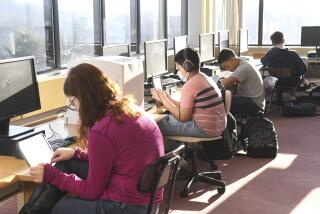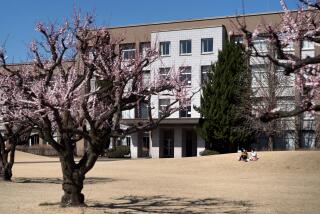U.S. Students’ Math Skills Still Lag Asians’ : Education: UCI study involving Japanese and Taiwanese shows Americans did no better than in 1980 comparisons.
- Share via
WASHINGTON — A new study of math skills shows that American students did no better than in 1980 when experts found they lagged far behind their Taiwanese and Japanese peers.
“We conclude the achievement gap is real, that it is persistent and that it is unlikely to diminish” without a change in American attitudes toward education, UC Irvine and University of Michigan researchers say in a study to be published today in the journal Science.
The study tested math comprehension of U.S., Japanese and Taiwanese first- and fifth-graders. It also retested many of the same students, now in the 11th grade, who participated in a study in 1980.
Additionally, the researchers surveyed the attitudes of American parents toward their children’s academic achievement.
The results show that U.S. students at all tested levels continue to be far behind the math achievement of the Japanese and Taiwanese and that American parents show little concern about the gap.
“American parents appeared to be no more likely in 1990 and 1991 than they were in 1980 to believe there is an urgent need for educational reform,” the study said. “They did not seem to be incensed by the low levels of performance by American students.”
Instead, the report said, American parents seem pleased and satisfied with the education their children are receiving.
In the study, the researchers tested students in Minneapolis, Taipei, Taiwan, and in Sendai, Japan. Among those students were 212 American 11th-graders who were tested when they were first-graders. There were 169 Taiwanese students who were in the original study and 93 students from Japan.
Math testing was also conducted among 240 fifth-graders in each country.
It said that among 11th-graders, only 14.5% of the Taiwanese and 8% of the Japanese students received scores below the average score of the American students.
Among fifth-graders, only 4.1% of the Taiwanese children and 10.3% of the Japanese in 1990 had scores as low as those of the average American child.
The 1980 study as well showed that American mothers expressed a high level of satisfaction with the U.S. education system. Since then, there have been widely published reports about how poorly U.S. students performed compared to their peers in other countries.
Despite the publicity, the researchers said, more than 80% of the American parents surveyed in the new study said they were satisfied with their children’s education.
Asked to evaluate the job their schools were doing, 79% of the American parents rated their schools are “good” or “excellent,” while only 44% of the Taipei parents and 48% of the Sendai parents gave such high ratings.
The study was conducted by Shin-Ying Lee and Harold W. Stevenson of the University of Michigan, and by Chuansheng Chen of UC Irvine.
More to Read
Sign up for Essential California
The most important California stories and recommendations in your inbox every morning.
You may occasionally receive promotional content from the Los Angeles Times.










